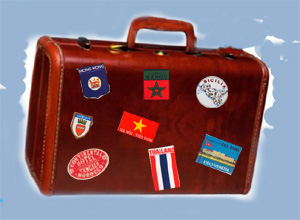Only fifteen years ago, in 1989, passengers were smoking on airliners, even standing in the aisles waiting for toilets. Some were probably even using their nail clippers or tweezers without being deprived by security of those lethal weapons. Moreover, that was only a scant ten years before that when Iranian revolutionaries had kept Americans hostage for 444 days and Iranians were immigrating to the land of the Great Satan. A lot has changed since then, and a lot hasn’t.
Landing in America
The woman who slumped into the seat next to me on the Alitalia flight from Milan looked exhausted. She was wild-eyed, certainly disoriented, and probably terrified, maybe even disturbed. Her slip hung down several inches below her cheap, flower-print dress, her footwear was ragged slippers.
When she fell back into the seat her head clunked against the window, and the cheap, canvas bag she dropped spilled fruit and sundries around her feet. She was asleep, or passed out, in seconds, mouth agape, displaying several teeth in need of attention. I fully expected to be vomited upon before we reached cruising altitude.
“Just my luck,” I mumbled. Fourteen cramped and tedious hours ahead before I would sight the perpetually-clogged LA freeways. Some fortunate fool was up in the First Class cabin seated next to Sophia Loren, the perpetually stunning actress who also boarded at Milan, and the fates that issue boarding passes had matched me with this poor, sick wretch.
Our multi-lingual flight attendant had difficulty waking her to get her to buckle her seat belt. He had to use mime, after Italian, Spanish, French and German received only blank stares. English failed, too, and I knew that conversation was definitely out when I spied the Farsi-English phrase book among the fruit and crackers on the floor.
But that was quickly replaced by a more unsettling concern when we leveled out at 35,000 feet, the “no-smoking” light went out, and the spacious “emergency exit” area on which our seats fronted became a smoke-filled Tehran square. My seatmate pulled out some crumpled Marlboros and her face brightened slightly at hearing her own language. At least she wasn’t alone. My own face probably reflected my grim speculations that there might be a bomb-toting revolutionary guard among what was proving to be a village of Iranian passengers. My wish not to be vomited upon was replaced by the hope that the lucky seatmate of Sophia was not Salman Rushdie. Every bump and clunk of turbulence that I used to ignore now took on ominous portent. I smiled weakly at my seatmate; it was requited. But we never exchanged a word.

© 2003, James A. Clapp
Well, as they say, I am here to tell the tale. My battered luggage, which I was going to discard after this trip rubbed against Sophia’s when it came onto the conveyor—yes, she stood there patiently, like the rest of us—so I think I’ll keep it forever. And the last I saw of my seatmate was her disheveled body in the stalled customs line for “aliens,” hauling a cheap suitcase and some bursting cartons. My customs agent hastily flipped through my passport, said “welcome home,” and waved me through.
I was, as Springsteen might paraphrase himself, “back in the U.S.A.” My seatmate, as I had learned from another of her group, was an immigrant to our “land of opportunity.”
On the flight down to San Diego I wondered how the land she had heard was the “Great Satan” would turn out for her. America, and the world are very different from the time my grandparents came over from Italy in steerage, more complex, more difficult. Our earlier immigrants arrived at a time in which much of America was being built: canals, railroads, industry, and especially its cities. The country needed willing labor with strong backs and not much else. Since that time much has changed in every facet of American life that has made it more difficult for immigrants to gain an economic foothold, especially massive structural changes in the economy. The new waves of immigrants may be coming to America with the same hopes as their predecessors, but it’s a different America. They may have the same spirit, but they will find America’s spirit diminished. They will find it freer than their homelands, but they will encounter the xenophobic and “Nativist” resistance that has always been here. Most will be willing to do their stints at stoop labor, pump Slurpees at 7-11s, and work long hours at their family groceries in their ethnic enclaves to get to their chance at the American dream; but they will also learn that America’s promises don’t come with guarantees.
I could only conclude that she was coming here with some hope, and as I was returning from several months abroad with much of the gnawing cynicism with which I had left, I envied her that. I could only hope that she would not encounter the suspicion that often greets the alien, in her case overlaid with the enmity between Iran and America, and be prejudged by her religion or the behavior of the government of her homeland? Neither of us had landed in the country of Satan; but sadly, for myself at least, these days it doesn’t seem much like “God’s country” either. Maybe my seatmate, and her Asian, Middle Eastern and Central American counterparts are just what this country needs to find itself—some new blood. I doubt I’ll ever get another chance to ask her what she thinks of America, or, for that matter, to ask Sophia.
___________________________________
©1989, ©2004, James A. Clapp (UrbisMedia Ltd. Pub. 1.11.2004)
Radio Essay No. 48, Aired KPBS-FM, Public Radio, November 18, 1989
